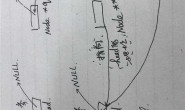|
代码如下:
#include "stdafx.h"
#define FILENAME1 "filename1.txt"
#define FILENAME2 "filename2.txt"
#define NUM 10
int _tmain(int argc, _TCHAR* argv[])
{
FILE* p1=NULL;//文件指针,指向读入数据的文件
FILE* p2=NULL;//文件指针,指向需要修改的文件
int i; //循环控制变量,控制读写次数
char ch;
char buff[1024];
char read_fpxxfpje[9];
//write_fpxxfpje[10];
if ((p1 = fopen(FILENAME1, "rb")) == NULL)
{
printf("读取文件失败,按回车键退出!\n"); //输出错误提示
while (1) //死循环控制错误提示
{
ch = getchar();
if (ch == ""\n"")break; //满足条件退出循环
}
exit(1);
}
if ((p2 = fopen(FILENAME2, "rb+")) == NULL)
{
printf("写入文件失败,按回车键退出!\n"); //输出错误提示
while (1) //死循环控制错误提示
{
ch = getchar();
if (ch == ""\n"")break; //满足条件退出循环
}
exit(1);
}
memset(buff, 0, 1024); //数组元素置零
for (i = 0; i < NUM; i++)
{
if (fgets(buff, 1024, p1) != NULL) //检查能否读取read指向文件的第一行数据
{
memset(read_fpxxfpje, 0, 9);
memcpy(read_fpxxfpje, buff + 514, 8); //复制read指向文件第一行数据第514~523个数据,赋予read_fpxx.fpje
printf("read_fpxx.fpje:%s\n", read_fpxxfpje); //输出.fpje的值
}
else
printf("获取第%d行数据失败",i); //不能打开文件提示错误信息
if (fgets(buff, 1024, p2) != NULL) //检查能否读取数据
{
fseek(p2, 32L,0);
fputs(read_fpxxfpje, p2);
fseek(p2, 109L, 1);
}
else
printf("写入第%d行数据失败", i);
}
fclose(p1);
fclose(p2);
while (1) //死循环控制错误提示
{
printf("程序执行完成,请按回车键退出程序!");
ch = getchar();
if (ch == ""\n"")break; //满足条件退出循环
}
exit(1);
return 0;
}
想读filename1文件的固定内容,然后写入到filename2文件的固定位置,现在解决不了的问题是写的时候重复写在第一行。。
if (fgets(buff, 1024, p2) != NULL) //检查能否读取数据
{
fseek(p2, 32L,0);
fputs(read_fpxxfpje, p2);
fseek(p2, 109L, 1);
}
else
printf("写入第%d行数据失败", i);
我觉得应该是上面这个fseek(p2,32L,0)这部分出了问题,每循环一次都把光标移到文件开头位置往后32L的地方了,有没有办法让此句只运行一次?或者有其他办法解决光标的位置问题不?BAIDU了好久找不到办法来求助各位。。 |
|
| 20分 |
修改如下:
if (fgets(buff, 1024, p2) != NULL) //检查能否读取数据
{
fseek(p2, 32L + i * 8, 0); //主要对这句,进行修改
fputs(read_fpxxfpje, p2);
//fseek(p2, 109L, 1); //这句没看出有什么作用
}
|
| 20分 |
fopen, _wfopen
Open a file. FILE *fopen( const char *filename, const char *mode ); FILE *_wfopen( const wchar_t *filename, const wchar_t *mode ); Function Required Header Compatibility For additional compatibility information, see Compatibility in the Introduction. Libraries LIBC.LIB Single thread static library, retail version The c, n, and t mode options are Microsoft extensions for fopen and _fdopen and should not be used where ANSI portability is desired. Return Value Each of these functions returns a pointer to the open file. A null pointer value indicates an error. Parameters filename Filename mode Type of access permitted Remarks The fopen function opens the file specified by filename. _wfopen is a wide-character version of fopen; the arguments to _wfopen are wide-character strings. _wfopen and fopen behave identically otherwise. Generic-Text Routine Mappings TCHAR.H Routine _UNICODE & _MBCS Not Defined _MBCS Defined _UNICODE Defined The character string mode specifies the type of access requested for the file, as follows: “r” Opens for reading. If the file does not exist or cannot be found, the fopen call fails. “w” Opens an empty file for writing. If the given file exists, its contents are destroyed. “a” Opens for writing at the end of the file (appending) without removing the EOF marker before writing new data to the file; creates the file first if it doesn’t exist. “r+” Opens for both reading and writing. (The file must exist.) “w+” Opens an empty file for both reading and writing. If the given file exists, its contents are destroyed. “a+” Opens for reading and appending; the appending operation includes the removal of the EOF marker before new data is written to the file and the EOF marker is restored after writing is complete; creates the file first if it doesn’t exist. When a file is opened with the “a” or “a+” access type, all write operations occur at the end of the file. The file pointer can be repositioned using fseek or rewind, but is always moved back to the end of the file before any write operation is carried out. Thus, existing data cannot be overwritten. The “a” mode does not remove the EOF marker before appending to the file. After appending has occurred, the MS-DOS TYPE command only shows data up to the original EOF marker and not any data appended to the file. The “a+” mode does remove the EOF marker before appending to the file. After appending, the MS-DOS TYPE command shows all data in the file. The “a+” mode is required for appending to a stream file that is terminated with the CTRL+Z EOF marker. When the “r+”, “w+”, or “a+” access type is specified, both reading and writing are allowed (the file is said to be open for “update”). However, when you switch between reading and writing, there must be an intervening fflush, fsetpos, fseek, or rewind operation. The current position can be specified for the fsetpos or fseek operation, if desired. In addition to the above values, the following characters can be included in mode to specify the translation mode for newline characters: t Open in text (translated) mode. In this mode, CTRL+Z is interpreted as an end-of-file character on input. In files opened for reading/writing with “a+”, fopen checks for a CTRL+Z at the end of the file and removes it, if possible. This is done because using fseek and ftell to move within a file that ends with a CTRL+Z, may cause fseek to behave improperly near the end of the file. Also, in text mode, carriage return–linefeed combinations are translated into single linefeeds on input, and linefeed characters are translated to carriage return–linefeed combinations on output. When a Unicode stream-I/O function operates in text mode (the default), the source or destination stream is assumed to be a sequence of multibyte characters. Therefore, the Unicode stream-input functions convert multibyte characters to wide characters (as if by a call to the mbtowc function). For the same reason, the Unicode stream-output functions convert wide characters to multibyte characters (as if by a call to the wctomb function). b Open in binary (untranslated) mode; translations involving carriage-return and linefeed characters are suppressed. If t or b is not given in mode, the default translation mode is defined by the global variable _fmode. If t or b is prefixed to the argument, the function fails and returns NULL. For more information about using text and binary modes in Unicode and multibyte stream-I/O, see Text and Binary Mode File I/O and Unicode Stream I/O in Text and Binary Modes. c Enable the commit flag for the associated filename so that the contents of the file buffer are written directly to disk if either fflush or _flushall is called. n Reset the commit flag for the associated filename to “no-commit.” This is the default. It also overrides the global commit flag if you link your program with COMMODE.OBJ. The global commit flag default is “no-commit” unless you explicitly link your program with COMMODE.OBJ. Valid characters for the mode string used in fopen and _fdopen correspond to oflag arguments used in _open and _sopen, as follows. Characters in mode String Equivalent oflag Value for _open/_sopen Example /* FOPEN.C: This program opens files named “data” #include <stdio.h> FILE *stream, *stream2; void main( void ) /* Open for read (will fail if file “data” does not exist) */ /* Open for write */ /* Close stream */ /* All other files are closed: */ Output The file “”data”” was opened Stream I/O Routines See Also fclose, _fdopen, ferror, _fileno, freopen, _open, _setmode |




